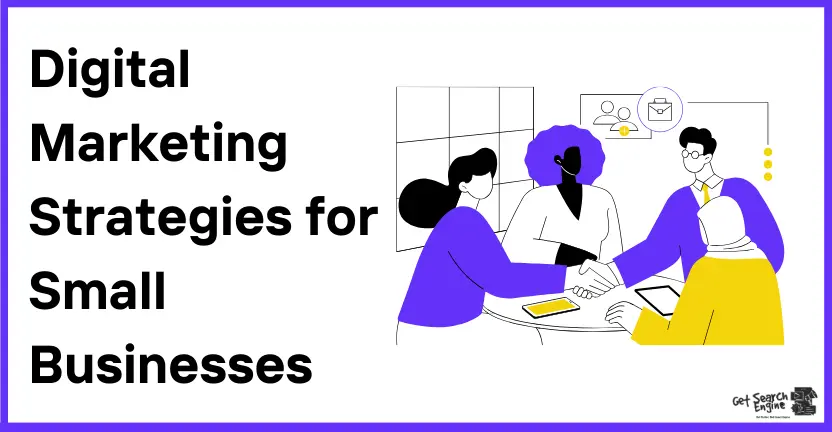Most small businesses don’t fail because “marketing doesn’t work.” They struggle because they’re hopping between tactics, Instagram one week, Google Ads the next, without a clear digital marketing strategy tying it all together.
That’s where digital marketing strategies for small businesses come in. Instead of random posts and campaigns, you have a simple plan that says: who you’re targeting, where you’ll reach them, what you’ll offer, and how you’ll measure success.
The real benefits of a digital marketing strategy aren’t buzzwords. It’s focus (no more chasing every trend), better use of a limited budget, and a clearer line from “we did X” to “we got Y leads or sales.” In the rest of this guide, we’ll treat digital marketing and strategy as one thing: a practical, working system you can actually run with a small team and a real-world schedule.
What Is a Digital Marketing Strategy for Small Businesses?
When people ask what a digital marketing strategy is, the answer is often overcomplicated. In plain language: it’s a documented plan for how you’ll use online channels to reach the right people and turn them into customers.
A clean digital marketing strategy definition for a small business looks like this:
A focused plan that connects your ideal customer, your offers, your channels (search, social, email, etc.), and your budget to specific, measurable goals.
If you define digital marketing strategy that way, it becomes much easier to use. You’re not trying to “be everywhere.” You’re picking a handful of channels and activities that fit how your customers already behave.
A simple digital marketing strategy example for a local service business might be:
- Target: homeowners in [city] with properties over a certain value
- Channels: Google Search + Local SEO + remarketing
- Offer: free inspection or consultation
- Journey: search → local landing page → form/call → follow-up sequence
That’s it. A digital marketing strategy for a small business doesn’t need 40 pages or fancy diagrams. It needs clarity: who you want, where you’ll show up, what you’ll say, and what happens after someone raises their hand.
A Simple Full-Funnel Digital Marketing Strategy for Small Businesses
Most digital marketing strategies for small businesses fail because they skip straight to “what should we post?” instead of asking “where is the customer in their journey?”
A full funnel digital marketing strategy keeps that journey front and centre:
- Awareness – they realise they have a problem
- Consideration – they compare options
- Conversion – they choose and contact someone
- Retention – they come back and refer others.
Your digital marketing strategy steps should mirror this:
- Use search, social, and lightpaid campaigns for Awareness
- Use content, reviews, and case studies for Consideration.
- Use strong landing pages and clear CTAs for Conversion.
- Use email, remarketing, and simple loyalty offers for Retention.
For most small local brands, the most effective digital marketing strategies for small local businesses look like:
- Strong Google presence (SEO + local)
- One or two social channels where customers actually hang out
- A basic email/WhatsApp follow-up system
That combination scales into a digital marketing growth strategy:
Start narrow, prove one funnel (e.g., Google Search → landing page → call → sale), then gradually add new channels to support the same journey. You’re building a small set of digital marketing strategies, not a chaotic list of tactics.
Build a Website and Local Landing Pages That Actually Convert
Before channels, you need somewhere solid to send people. A practical digital marketing strategy plan usually starts with one thing: build a website for a local business that’s fast, clear, and built to convert.
At a minimum, your site should:
- Explain who you are and what you do in the first screen
- Show social proof (reviews, logos, results)
- Make it obvious how to call, book, or visit.
For local brands, the real work is in local landing pages. Think:
- One page per key service (e.g., “root canal in [city]”)
- One page per important area if you serve multiple neighbourhoods
Each of those pages should pass a basic on-page SEO checklist:
- Service + city in title, H1, and naturally in copy
- Clear NAP (name, address, phone) and embedded map
- Internal links to related services and FAQs
- Unique content, not cloned across every area.
Don’t forget website accessibility. Things like readable fonts, contrast, alt text, and keyboard navigation help more people use your site, and send good UX signals back to search engines.
Once the basics work, use landing page optimization using heatmaps to see:
- Where people stop scrolling
- Which buttons get ignored
- Whether forms are too long or badly placed
This is where digital marketing content strategy becomes concrete. Every blog post, ad, and email should point to a small set of focused pages that make it easy for a visitor to become a lead.
Search and Local SEO in the Age of AI Overviews
Search is still the backbone of most digital marketing strategies for small businesses. But the results page is changing fast, especially with AI summaries and “overview” boxes sitting above the blue links.
That doesn’t make SEO pointless. It just changes what great looks like.
Start with the basics you control:
- Solid local landing pages for each key service/area
- A clean on-page SEO checklist for every important page
- Clear topic
- Useful content
- Fast load
- The obvious next step
- Clear topic
Then layer in an AI-aware approach.
When people talk about AI overviews, SE, O, or Google AI overview SEO impact, they’re really asking: “If Google (or another model) is summarising the web, why would it choose my page as a source?”
A practical AI SEO strategy for a small local brand looks like this:
- Answer real questions in-depth on your site, not just “service + city” fluff
- Use structured headings and FAQs so content is easy to parse
- Include clear details AI systems love: who you serve, where, how it works, pricing ranges, and policies.
This is where AI tools for local SEO help, not as magic, but as accelerators:
- Keyword and question research
- Drafting outlines and FAQs
- Spotting gaps in competitors’ content
Tie all of that back to your content strategy for digital marketing: create pages and posts that solve specific problems for people in your area. If humans find your content genuinely helpful and easy to act on, you’re giving both search engines and AI overviews a strong reason to surface you.
Digital Content Marketing Strategy That Works on a Small-Business Schedule
Most small teams don’t need “more content.” They need a digital content marketing strategy that they can actually keep up with, one that feeds search, social, and email without burning everyone out.
Think of content strategy for digital marketing as the engine behind your funnel:
- Search content brings people in
- Social content keeps you visible.
Email WhatsApp content nudges people to act.
You don’t need to publish everywhere. You need a simple digital marketing content strategy built around a few core moves:
- One hero piece per month
- A deep blog, guide, checklist, or video on a real problem your customers have
- Optimised for search and linked from your local landing pages
- A deep blog, guide, checklist, or video on a real problem your customers have
- Spin-offs for social and email
- 3–5 short posts pulled from that hero piece
- A simple newsletter summarising the main idea with one clear CTA
- 3–5 short posts pulled from that hero piece
- Always-on FAQs and proof
- Short posts answering common questions
- Testimonials, case studies, before/after transformations
- Short posts answering common questions
When you think of campAIgns, you’re essentially running a lightweight digital marketing campaign strategy every time you launch something seasonal, run a sale, or host an event:
- Goal: what you want (leads, sign-ups, bookings)
- Message: what you’re saying and to whom
- Assets: hero piece + supporting posts/emAIls
- Destination: the landing page where action happens
That’s all content strategy digital marketing really is in practice: a repeatable way to turn one good idea into multiple touchpoints that move people through your funnel, instead of random one-off posts that go nowhere.
Cost-Effective Digital Marketing Strategies with Paid Campaigns
Organic is great, but at some point you want to press the accelerator. That’s where Paid fits into digital marketing strategies for small businesses, not as a replacement, but as a way to test and scale what’s already working.
A good campaign strategy, digital marketing setup for a small budget is boring in the best way:
- One core offer
- Free consult, audit, quote, trial, or intro package
- Tied to a specific service, not “we do everything”
- Free consult, audit, quote, trial, or intro package
- One primary audience
- Clear geo (your actual service area)
- Clear segment (homeowners, parents, founders, HR, etc.)
- Clear geo (your actual service area)
- One focused landing page
- Matches the promise in the ad
- Re-uses your best copy and proof
- Has one obvious action: book, call, or sign up
- Matches the promise in the ad
That’s the heart of a practical digital marketing campaign strategy.
For most firms, the best digital marketing strategies for small businesses with paid media look like:
- Search ads for people actively looking (high intent)
- Social ads for awareness + retargeting (warm audiences)
- Occasional boosts around key seasonal campaigns
To keep this in the realm of cost-effective digital marketing strategies for small businesses:
- Start with tiny daily budgets and tight targeting
- Kill anything that spends without leads
- Shift budget into the few ad groups, audiences, or creatives that clearly win
Over time, this is how you discover your best digital marketing strategy in practice, not by theory, but by watching which simple campaigns reliably turn ad spend into real enquiries.
If you keep your digital marketing strategies for small businesses, this focused, one offer, one audience, one page per campaign, Paid becomes a clear, controllable lever instead of a black hole.
Measuring What Matters in Your Digital Marketing Strategy
A plan is only useful if you know whether it’s working. That’s where measurement and a simple digital marketing strategy audit come in, especially when you’re juggling multiple channels with a small team.
Think of digital marketing strategy and planning as a loop, not a one-time document:
Plan → Execute → Measure → Adjust → Repeat
Every quarter, review three layers.
1. Channel performance
For each channel (search, social, email, paid), look at:
- Traffic or reach
- Leads or enquiries generated
- Cost per lead (if paid)
Use this to refine your digital marketing strategy plan:
- Double down on channels that consistently bring leads
- Fix or pause those that bring noise but no enquiries
2. Landing page performance
Your website is where most decisions happen, so include landing page optimization using heatmaps and analytics in every review:
- Where do people stop scrolling?
- Which buttons or links get ignored?
- Do forms feel too long or badly placed?
Heatmaps and session recordings show how real visitors behave so you can adjust layout, copy, and CTAs with evidence, not guesses.
3. Strategy fit and gaps
Finally, zoom out into a light digital marketing strategy audit:
- Are your channels still aligned with your ideal customer?
- Are you clear on which offers convert best?
- Is your follow-up (email/WhatsApp/CRM) actually happening?
If this feels overwhelming, that’s when digital marketing strategy services can help: an external view to pressure-test your assumptions, tidy your data, and sharpen the plan, so the next quarter isn’t just “try harder,” but “do more of what we know works.”
Advanced AI SEO Strategy, Agents, and What’s Coming Next
If you’re comfortable with the basics and curious where search is heading, this is the layer to pay attention to, not mandatory, but useful context for your next 2–3 years of planning.
At a high level, an AI SEO strategy is about two things:
- Using AI to work faster and think clearer (research, ideation, drafting).
- Understanding how AI-powered search surfaces and summarises content.
That’s where conversations about AI overviews SEO, and Google AI overview SEO impact come in. If search results include AI summaries, you want your pages to be the ones those summaries cite:
- Clear topical focus
- In-depth answers to real questions
- Strong local and entity signals
On the execution side, AI tools for local SEO and SEO AI agents ideation workflows can help you:
- Cluster keywords and questions by intent and location
- Draft briefs and outlines for new pages
- Generate angles for outreach and content updates
You’ll increasingly hear terms like AI agents vs agentic AI. For our purposes:
- AI agents = systems that can handle a sequence of SEO tasks with some autonomy
- Agentic AI = broader architectures that orchestrate multiple agents/tools together
Under the hood, search and AI systems are shifting toward things like Muvera multi-vector retrieval, fancier ways of matching queries to content across multiple meanings and contexts. For you, that reinforces the need for focused, high-quality pages rather than thin, generic ones.
You may also see discussions of what is LLMS TXT, a proposed way to give AI crawlers extra instructions. Interesting, but still experimental; your fundamentals matter more.
If this whole section excites you enough to wonder how to become an AI engineer, great, but as an owner, you mostly need a pragmatic, AI-assisted workflow. When you’re ready to operationalise any of this more seriously, that’s where digital marketing strategy consulting can help turn buzzwords into a concrete roadmap and processes your team can actually run.
Do You Need a Digital Marketing Strategy Consultant or Agency?
You don’t have to hire help to build solid digital marketing strategies for small businesses. If you have one location, a clear offer, and time to learn, you can get very far with a focused DIY plan.
But there are clear points where digital marketing strategy services start to make sense:
- You’re spending real money on ads and aren’t sure what’s working
- Different people “own” different channels, but no one owns the whole picture
- Reporting feels messy and decisions are made on gut, not data
A good digital marketing strategy consultant won’t just give you a prettier version of what you already know. They should help you:
- Clarify positioning and ideal customer
- Prioritise channels instead of trying to do everything
- Design a practical measurement and reporting cadence
- Build a roadmap your team can execute without constant hand-holding
Larger or multi-location brands might look at digital marketing strategy consulting via agencies. The best digital marketing strategy agencies for small businesses usually have three traits:
- They talk about systems and funnels, not just “posting more”
- They’re transparent about what they do vs what you own
- They tie their work to leads, pipeline, and revenue, not just impressions and likes
Whether you stay DIY or bring in help, the goal is the same: a simple, coherent strategy you can actually run week after week.
Turn Strategy into a Simple Weekly Routine
The point of all this isn’t to build a 40-page deck. It’s to turn digital marketing strategies for small businesses into something you can run in a couple of focused hours each week.
Start by writing a lightweight digital marketing strategy template (or grab any template for digital marketing strategy and customise it). At minimum, capture:
- Who you want to reach
- What you’re selling first
- Which 2–3 channels matter now
- Which pages/levers turn attention into leads
From there, your job is to keep iterating:
- Each week: ship a few small actions (content, page tweaks, campaign)
- Each month: review basic numbers and tidy what’s messy
- Each quarter: zoom out, revisit your digital marketing strategies for small business, and decide what to double down on or drop.
You don’t need the perfect plan. You need a clear, written one that your team can actually follow, and the discipline to keep improving it a little each cycle.
Frequently Asked Questions
What is a digital marketing strategy for small businesses?
How do I create a digital marketing strategy?
What AI tools are good for local SEO optimization tasks?
Which channels work best for small local businesses?
When should I hire a digital marketing strategy consultant?





